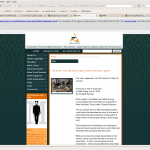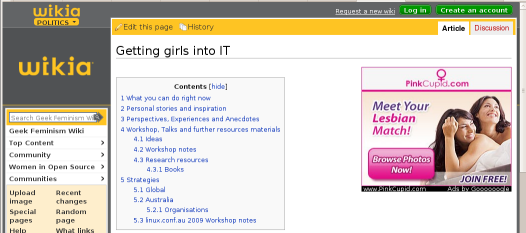The keynote this morning was from Simon Phipps from Sun. I thought he was quite good especially since he was in front of an audience that was not 100% friendly. One of the interesting statements he made was pointing out that it was hard for a company to install a free version of Redhat ( say Centos or Fedora ) and then later start getting commercial support for it. As things are right now you would have to reinstall all your servers with RHEL in order for it Redhat to support you. He felt that sooner or later Redhat would have to change their policy in order to allow easy transition for people, although at least one redhat person in the audience either missed his point or completely disagreed with it.
Next I went to a talk from Mathew Wilcox on Solid state drives. It was pretty interesting although a little over my head.
Afterwards I hosted ( to the extent I stood up, wrote notes and pointed at people) a BOF for Miniconf organisers. Around a dozen people showed up including about 3/4s of this year’s miniconfs plus at least one perspective on for next year. We had a good round of discussion and I wrote up a few notes (not really for public sorry , but contact me if you have a special interest) and somehow volunteered to help setup a Miniconf Organiser’s howto document.
After lunch I went to sessions on Power management and usability. Bother excellent and giving me a chance to pick up some information in areas outside of what I normally do.
Then it was a presentation from Terri Irving at Dreamhost, she did some overview stuff about how they do things and then a little bit about how they use their internal “servicectl” tool to provision and run their services but not a lot of technical nitty gritty. She used the second part of her talk to introduce the Ceph distributed file system that one of the Dreamhost people are working on ( which is publicly released) so the talk wasn’t a total loss though.
I had a bit of a headache so I skipped the lightning talks and the wind-up and announcement for next year. As expected it’ll be in Wellington. Generally I think this should work out okay, the extra distance for Australians should be balanced by a good number of locals attending, I did hear some concern about lack of the publication of the bid documents and the fact that the Wellington organisation seems to be a “company led” rather than a “community led” . Also I am not sure if cheap accommodation is going to be available, having the college dorms like in previous years is great, lots of space, security and closeness to the other attendees at a low price. Hopefully Wellington can do something similar.
Anyway I missed all of that and had a snooze till after 7 when I got up and went into the Sandy Bay shops with a few guys. On the way we went via the party but it didn’t seem to be much fun. The drinks were “buy your own” (probably to avoid problems from previous years) and the food was of the sausage roll type ( I heard that Google was unimpressed with the food quality after having dropped a lot of $$$$ towards it).
Ended up going to a nice pizza place with 4-5 other guys and having a really nice pizza at a good cheap price (low $20s per head) . The manager even gave us some shots at the end free ( cool, although I don’t drink so just had a small one).
Next day was the the semi post-conference with the Open Day being the only real official thing happening plus a cheesy sounding “march” from Salamanca place to the Open Day ( at the Casino). I decided to skip these and went to the Salamanca market instead. I was really impressed with the whole thing, 2-300 stalls of mostly high quality with plenty to choose from, since I was flying back to NZ I couldn’t buy much food to take away but I got some nice fudge and ate at a couple of vendor stalls. Couple of galleries by other people here and here.
And apart from an uneventful trip back that was my linux.conf.au for 2009.
Overall I felt the whole event was on par with previous years, I understand they had a few speakers and attendees drop out at the last minute which was a bit unlucky and the extra travel distance probably put some off. I got them impression there were not as many locals as in previous years but I guess Hobart isn’t a big place.
The organisers seemed pretty on the ball most of the time and largely kept in the background compared to previous years. The weather was pretty good (apart from some sprinklings of rain) and not enough to extremes to cause problems. I’ll definitely be back again.

